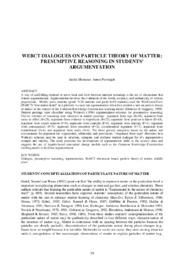| dc.contributor.author | Ebenezer, Jazlin | en |
| dc.coverage.spatial | CY - Λευκωσία | en |
| dc.creator | Ebenezer, Jazlin | en |
| dc.date.accessioned | 2016-02-25T06:33:15Z | |
| dc.date.available | 2016-02-25T06:33:15Z | |
| dc.date.issued | 2003 | |
| dc.identifier.uri | http://hdl.handle.net/10797/14779 | en |
| dc.description | Περιέχει το πλήρες κείμενο | el |
| dc.description.abstract | A way of scaffolding students to move back and forth between multiple meanings is the use of discussions that feature argumentation. Argumentation involves the evaluation of the worth, accuracy, and authenticity of various propositions. Middle years students (grade 7=28 students and grade 8=30 students) used the WebCourseTools (WebCT) “discussion board” as a platform to carry out argumentation when they studied a unit on particle theory of matter in the context of the Common Knowledge Construction teaching model (Ebenezer & Haggerty, 1999). Student postings were classified using Walton’s (1996) argumentation schemes for presumptive reasoning. Twelve schemes of reasoning were observed in student postings: argument from sign (F=45), argument from cause to effect (F=25), argument from evidence to hypothesis (F=22), argument from position to know (F=14), argument from expert opinion (F=9), argument from example (F=6), argument from analogy (F=4), argument from consequences (F=3); argument from precedent (F=2), circumstantial argument (F=1), argument from commitment (F=1), and argument from waste (F=1). The three general categories based on the nature and circumstance for argument are: experiential, referential, and provisional. “Argument from sign” illustrates how Walton’s schemes may be used to structure, interpret, and evaluate student dialogue for it’s argumentative strength and validity. The study promotes the development of argumentative skills in the science class and suggests the use of inquiry-based conceptual change models such as the Common Knowledge Construction teaching model to facilitate argumentation. | en |
| dc.language.iso | eng | en |
| dc.publisher | Department of Educational Sciences, University of Cyprus | en |
| dc.relation.ispartof | New technologies | en |
| dc.rights | info:eu-repo/semantics/openAccess | en |
| dc.rights | Open Access | en |
| dc.source | CBLIS Conference Proceedings 2003 Volume II: The educational potencial of new technologies | en |
| dc.title | WebCT dialogues on particle theory of matter: presumptive reasoning in students’ argumentation | en |
| dc.type | info:eu-repo/semantics/conferenceObject | en |
| dc.subject.uncontrolledterm | Dialogue | en |
| dc.subject.uncontrolledterm | Presumptive reasoning | en |
| dc.subject.uncontrolledterm | Argumentation | en |
| dc.subject.uncontrolledterm | WebCT discussion board | en |
| dc.subject.uncontrolledterm | Particle theory of matter | en |
| dc.subject.uncontrolledterm | Middle years | en |
| dc.contributor.conferenceorganizer | Learning in Physics Group, University of Cyprus | en |
| dc.contributor.coordinator | Constantinou, Constantinos P. | en |
